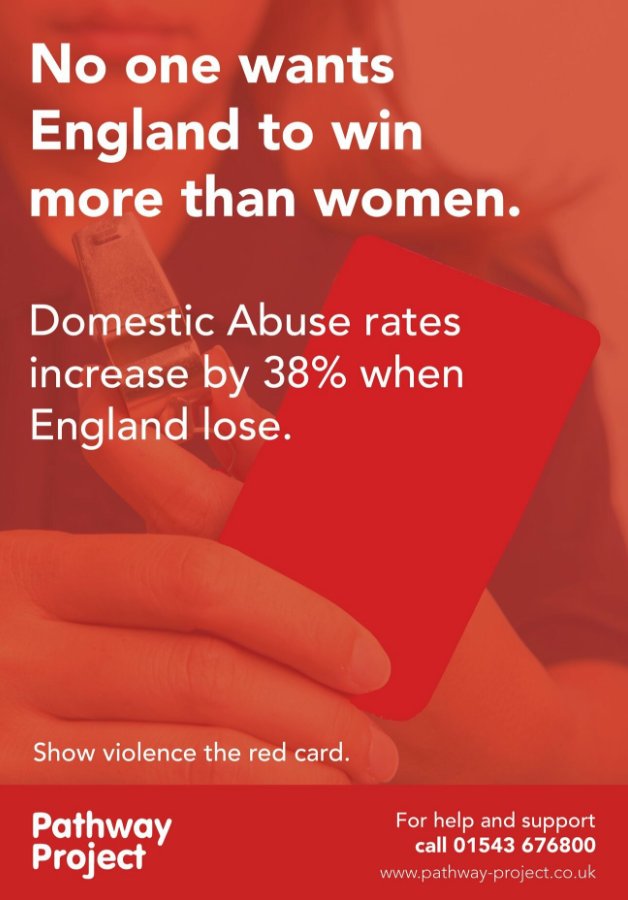“Domestic Abuse rates increase by 38% when England lose [a World Cup match].”
Pathway Project, 14 June 2018
An image citing the above figure has been shared almost 50,000 times on social media at the time of writing.

It’s based on a 2014 research paper that looked at the number of incidents of domestic abuse reported to one police force in England during three World Cup tournaments.
The study found this was 38% higher on days when England lost a match than on tournament days when England weren’t playing. It was also 26% higher when the team won or when there was a draw.
It is notoriously difficult to record, or even accurately define, domestic abuse, as is precisely calculating the scale of it, or how it changes over time. A number of studies have tried to measure changes in the number of incidents of domestic abuse around the time of big sporting events, such as the World Cup, by looking at the number of incidents reported to the police.
They have found that there does seem to be an increase in the number of reported incidents—the exact amount varies depending on the study and the result of the match. The studies tend to look at the overall numbers, rather than the details of each reported incident so it’s not possible to say with certainty that all the incidents being measured are directly linked to the match or its outcome.
Honesty in public debate matters
You can help us take action – and get our regular free email
The research looked at reported domestic abuse incidents in Lancashire
The domestic abuse charity Pathway Project told us the source of its claim was a 2013 paper from academics at Lancaster University.
The study, which its authors called “relatively small”, looked at the number of reported domestic abuse incidents over three World Cup tournaments between 2002 and 2010. The World Cup takes place every four years.
The researchers obtained the number of incidents of domestic abuse recorded daily during tournaments and the number of incidents recorded monthly over several years, from the Lancashire Constabulary. This included “those victims who have reported to the police a violent or threatening act from an individual they are currently (or have recently been), in an intimate relationship with”.
The incidents did not need to result in a crime being recorded or a prosecution to be counted in the analysis. The researchers used police reported incident data rather than survey data, like the British Crime Survey (now the Crime Survey for England and Wales), as it was “insufficiently detailed to monitor the short periods required for this type of analysis”.
It found incidents rose on days when England played
They found that the number of reports of domestic abuse increased by 26% on a day when the national team won or drew, and by 38% on a day when the team lost. The average number of incidents reported on days England played was 79 (whether the team won or lost), compared to 58 on days when they did not play.
They found that the day after a match, there was an 11% increase in risk even “after controlling for other factors”. The average number of incidents the day after a game was 71.
As the researchers point out, domestic abuse is notoriously under-reported to police. The Office for National Statistics estimated that 1.9 million adults in England and Wales experienced domestic abuse in the year to March 2017. The police recorded 1.1 million domestic abuse-related crimes and incidents over the same period.
You can read more about how difficult it is to collect representative domestic abuse data in our explainer.
Other studies have shown similar results
A 2012 study by the Royal Statistical Society and the BBC used Freedom of Information requests covering 33 of England’s 39 police forces to see if domestic abuse increased on England’s match days in the 2010 World Cup.
Comparing the four days during that tournament when England was playing to the same weekday when they weren’t, the authors found there was an estimated 28% increase in incidents on the day England won, and 32% on the day they lost. The other two matches of the tournaments saw England draw.
On the two days when England matches resulted in a draw, the study found “no significant increase” in the number of incidents reported.
A number of other studies looking at domestic abuse across the UK analysed by the Scottish Centre for Crime and Justice research found correlations between the timing of football matches and increased incidents. The report also looked at other studies finding similar links with other sporting events such as American football.
How is domestic abuse defined?
There’s no legal definition of domestic violence or domestic abuse, so there are no actual criminal offences under those names.
Instead, people are prosecuted under a range of offences which can be linked to domestic abuse, such as threats to kill, assault or rape. We’ve written more about this here.
Across government the definition of domestic violence and abuse is: “any incident or pattern of incidents of controlling, coercive, threatening behaviour, violence or abuse between those aged 16 or over who are, or have been, intimate partners or family members regardless of gender or sexuality.” It also encompasses, but isn’t limited to, psychological, physical, sexual, financial or emotional abuse.
Helplines
ITV have a list of helplines for men and women if you have been affected by any of the issues raised in this article.
